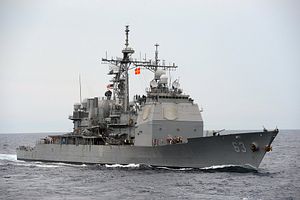Commander Salamander (whose blog you slackers should be checking out if you aren’t already) spotlights one of the weirder chapters in the annals of the U.S. Navy. The story comes courtesy of Navy Times reporter David Larter. Aegis cruiser USS Cowpens completed a seven-month deployment to the Far East this spring. She had a close call with China’s navy in the South China Sea, among many adventures. Nothing earthshaking there. Long, eventful cruises are de rigueur nowadays, as indeed they have been for many years.
The weirdness started when Cowpens arrived back home under the leadership not of her captain or her executive officer — her Number One — but of a relatively junior officer. The skipper had taken ill and confined himself to quarters. There was no executive officer. The previous one had departed for other duty and his relief was delayed en route. That left the chief engineer, a department head with 11 years’ experience, to oversee not just the engineering plant — a big enough job in itself, trust me — but also the operations and administration of one of America’s premier surface warships.
The weirdness continued when the relationship between the (male) skipper and (female) chief-engineer-cum-acting-captain came to light. The engineer, it appears, more or less moved in with the captain, cooking him dinner five or six times per week. For reasons that remain a mystery, the navy inquiry that established the salient facts and meted out judgment balked at finding the two culpable for fraternization. But the weirdness climaxed with this nugget: apparently no one in Cowpens‘ organizational chain of command had any inkling about this state of affairs until the vessel moored back home. No officer, no senior enlisted, no crewman dispatched an email or other communique alerting the brass.
Not for nothing does Larter term this a scene from The Twilight Zone. Where’s Rod Serling when you need him? A few takeaways from the middle ground between light and shadow, between science and superstition, between the pit of man’s fears and the summit of his knowledge. One, ships are still islands — in effect self-contained societies — once they cast off all lines. This is less true than in the days before wireless communication, to be sure. Far less. Crewmen can avail themselves of modern communications unless the command restricts emissions — as ships sometimes do to avoid detection. For the most part, though, remaining silent is no longer a brute fact of life. It’s a matter of choice. Why no Cowpens crewman chose to report the outlandish circumstances remains an open question.
Sal’s candidate explanation — misplaced loyalty to individuals rather than to the service — seems as plausible as any. Occam’s Razor applies.
Two, if ships remain islands, commanding officers remain their tribal chieftains. Authors from Herman Melville to Mark Twain attest to the autonomy and near-absolute rule afforded naval and merchant skippers on the high seas. Richard McKenna (a navy enlisted man and author, of Sand Pebbles fame) wrote an undergraduate paper at the University of North Carolina assessing the sociology of his ship out in the Pacific. One wonders what McKenna would’ve made of Cowpens, her absentee potentate, and the wardroom’s and crew’s efforts to make shift. Methinks it wouldn’t be pretty: McKenna had a sharp pen.
Three, leaderless societies often come to grief. Sal sees a silver lining limning the dark cloud around Cowpens. Namely, that a relatively junior officer rallied the crew and brought the ship through its journey without major mishap. And indeed, this would be a quasi-heartwarming tale had the crew, minus its doughty skipper, brought Cowpens home in fighting trim. But the navy inquisitors faulted the crew for neglecting the ship’s material condition and, more troublingly, for “gundecking” personnel qualifications. The flight deck, for instance, had deteriorated to a point where it was unsafe to operate helicopters. Good upkeep signifies professional excellence, slipshod upkeep something worrisome.
Gundecking — faking, in other words — qualifications is another symptom of cultural decay aboard ship. The U.S. Navy instituted a personnel qualification system, or PQS, to certify watchstanders, maintenance men, and a host of other shipboard functions. Aspirants study, get experienced personnel to test their knowledge, and undergo qualification boards before taking up some new job. Properly administered, PQS constitutes cultural maintenance to complement the material dimension of seafaring. Sloughing off isn’t just dishonest. It gives the navy a false impression of its seafaring and battle prowess. That’s the sort of thing that that might escape notice in peacetime yet haunt an armed force in combat. It betokens a loss of virtue among the crew. And, as Chinese sages of yore remind us, it takes virtuous leaders to instill virtue in a populace.
That’s the faintest of silver linings, if such it is. And lastly, such disgraces harm the navy’s renown for seamanship and combat prowess. Undercutting the fleet’s reputation undercuts its usefulness as a political implement. Edward Luttwak reminds us that who wins in peacetime disputes depends on who observers think would have won in wartime. Incidents like this one could implant doubt about the outcome in important audiences’ minds in future encounters. In turn, they could keep Washington from getting its way when it counts. There are bigger things at stake.

































